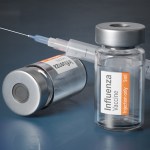BRIGHTER FUTURE OP-ED
Genetic testing opens new avenues for cancer diagnoses and treatment

A cost-saving and pioneering pathology-supported genetic testing strategy has been implemented in South Africa. This has been recognised as international best practice for the application of personalised medicine using an integrated service and research approach.
Cancer is one of the leading causes of death in Africa, where resource-challenged healthcare systems contribute to late-stage diagnosis and delayed treatment.
Alarming observations indicate that South African patients living in rural areas tend to experience more advanced disease than their urban counterparts. This highlights the pressing need for new healthcare solutions that prioritise enhanced access to quality care, reduce disparities in disease progression, and remove inequities due to geographic location and financial status.
Understanding the genetic basis of cancer is essential for developing personalised, targeted prevention and treatment approaches. Pathogenic germline variants (genetic alteration that occurs within egg or sperm cells) and somatic (tumour) mutations are two types of modifications with distinct implications for risk of cancer development, recurrence, and response to treatment. The difference lies in the cells in which the genetic alterations occur and their hereditary nature.
Germline variants can be passed on to children, contributing to hereditary medical conditions or normal differences such as eye colour. Somatic mutations, on the other hand, occur in non-germline cells, are not inherited, and arise during an individual’s lifetime.
There are several ways in which this knowledge can contribute to improving cancer prevention and treatment:
- Identification of familial versus lifestyle risk factors is valuable not only for the individual, but also for family members who may benefit from presymptomatic diagnosis and cancer prevention facilitated by regular screening and timely surgical intervention;
- Genomic testing can provide valuable prognostic information to guide treatment based on the aggressiveness of the cancer;
- By understanding the genetic characteristics of a tumour, treatment that will not be effective for a particular type of cancer can be avoided to prevent overtreatment, or to tailor the treatment plan for application of precision oncology;
- Identification of driver mutations that enhance the growth of cancer cells allows the use of targeted therapies designed to inhibit the activity of the affected genes;
- Immunotherapy based on the expression of certain biomarkers (molecules that indicate normal or abnormal processes in the body) may render the body’s immune system effective in recognising and attacking cancer cells;
- Genetic testing can be used to monitor how a tumour responds to treatment, allowing for treatment adjustment if needed, based on the effectiveness of the therapy; and
- Some patients may qualify for participation in clinical trials of innovative therapies that are not yet widely available.
It is, therefore, clear that genetic testing opens new avenues for service delivery and research in support of the three-year (2022-2024) World Cancer Day (4 February) “Close the care gap” campaign.
To increase public awareness and knowledge about these aspects, a data-management web application was developed to combine genetic counselling (helping individuals understand the genetic and medical implications of a condition) with a free wellness assessment using novel point-of-care technologies.
To address the multifaceted challenges encountered during the cancer journey, a cost-saving pathology-supported genetic testing strategy has been implemented in South Africa.
This pioneering approach has been recognised as international best practice for the application of personalised medicine using an integrated service and research approach. Integrating germline DNA testing with tumour genetics is crucial for the optimal treatment of patients who are at an elevated risk of secondary cancers, metastasis (cancer spreading to organs and tissues), medication side effects or failure.
An example of a new care pathway identified for patients with early-stage hormone receptor-positive breast cancer was reported by Lwando Mampunye and his co-authors in the journal Frontiers in Oncology (2021).
They provided compelling evidence to justify future implementation of a point-of-care test for breast cancer 1 (BRCA1) and breast cancer 2 (BRCA2) gene-variant detection in all patients referred for tumour-only gene profiling (MammaPrint®).
In this context, assessment of 150 genes found to accurately identify the different treatment groups are recommended for patients with early-stage breast cancer to provide a “yes” (treat) or “no” (do not treat) answer (no intermediate group) for chemotherapy and endocrine therapy benefit.
For patients with advanced cancers, more than 600 genes can be tested in DNA extracted from the tumour, including BRCA1 and BRCA2.
Transitioning from well-established laboratory-based technologies to a portable device (ParaDNA®) offers a feasible option for all BRCA1/2-associated breast, ovarian, prostate and pancreas cancers, bringing genetic testing, counselling and quality care to unreached communities.
For patients with these four types of cancer, the new BRCA point-of-care genetic test is not just for understanding family risks or making surgery decisions, it’s also useful to identify specific genetic changes that can be targeted with a certain type of medication.
Based on next-generation sequencing (rapid decoding of genetic information in DNA and detection of variants and mutations) data generated in more than 1,000 cancer patients tested in the public and private healthcare sectors of South Africa, first-tier BRCA1/2 genetic testing ensures the most cost-effective approach.
By supporting these technologies with genetic counselling, a future is envisioned where patients have access to personalised genomic medicine throughout the different stages of cancer care.
To advance genomic medicine (using a person’s genomic information as part of their clinical care) in Africa, we must use a standardised screening algorithm. This will ensure adherence to established guidelines, providing optimal care for cancer patients.
Currently, patients’ willingness to undergo therapy based on genomic test results faces obstacles due to potentially unsustainable costs for follow-up visits and family screening. Failing to act on genetic findings within a predetermined timeline is a waste of resources that could have benefited cancer patients and their at-risk family members.
Addressing this ethical dilemma involves using genetic/genomic counselling along with the creation of a wellness app-based code. This code interfaces with the reporting system linked to the portable ParaDNA® point-of-care genetic testing device, allowing upload of genetic results for verification at a reference laboratory.
Integration with the app-collected lifestyle and medical history data will empower on-site BRCA1/2 variant testing at clinics throughout South Africa. Access to quality care not only involves selecting the right tests and medication, but also avoiding chemotherapy overtreatment and its feared side effects, which can be more distressing than the cancer itself.
Dispelling negative perceptions surrounding cancer therapy becomes possible by understanding the advantages and limitations of genetic testing.
Conquering the apprehension associated with invasive surgeries becomes more feasible with the guidance of timely testing of inherited gene variants as this can potentially encourage individuals to seek medical attention earlier and improve their chances of survival.
This genomic perspective envisions a future where patients have enhanced access to personalised genomic medicine throughout the different stages of cancer care, diminishing health disparities and inequities. DM
Prof Maritha Kotze is a principal medical scientist in the Division of Chemical Pathology in the Faculty of Medicine and Health Sciences at Stellenbosch University and the National Health Laboratory Service at Tygerberg Hospital, Cape Town.

















Comments - Please login in order to comment.